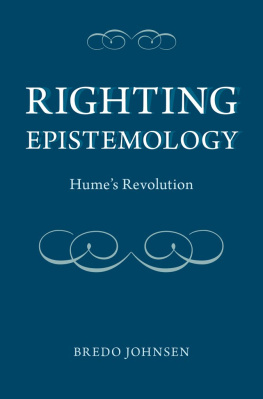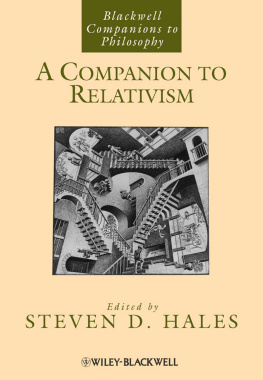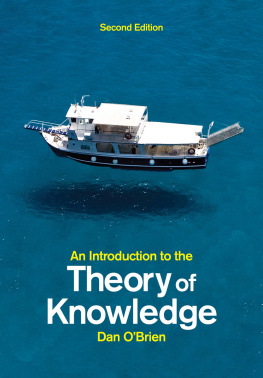Social Epistemology:
Essential Readings
Social Epistemology:
Essential Readings
EDITED BY
Alvin I. Goldman and Dennis Whitcomb


Oxford University Press, Inc., publishes works that further
Oxford Universitys objective of excellence
in research, scholarship, and education.
Oxford New York
Auckland Cape Town Dar es Salaam Hong Kong Karachi
Kuala Lumpur Madrid Melbourne Mexico City Nairobi
New Delhi Shanghai Taipei Toronto
With offices in
Argentina Austria Brazil Chile Czech Republic France Greece
Guatemala Hungary Italy Japan Poland Portugal Singapore
South Korea Switzerland Thailand Turkey Ukraine Vietnam
Copyright 2011 by Oxford University Press, Inc.
Published by Oxford University Press, Inc.
198 Madison Avenue, New York, New York 10016
www.oup.com
Oxford is a registered trademark of Oxford University Press
All rights reserved. No part of this publication may be reproduced,
stored in a retrieval system, or transmitted, in any form or by any means,
electronic, mechanical, photocopying, recording, or otherwise,
without the prior permission of Oxford University Press.
Social epistemology: essential readings/edited by Alvin I. Goldman and Dennis Whitcomb.
p. cm.
ISBN 978-0-19-533461-6 (pbk.: alk. paper)ISBN 978-0-19-533453-1 (hardcover: alk. paper)
1. Social epistemology. I. Goldman, Alvin I., 1938-II. Whitcomb, Dennis.
BD175.S622 2011
121dc22 2010004045
1 3 5 7 9 8 6 4 2
Printed in the United States of America
on acid-free paper
Table of Contents
,
Dennis Whitcomb
Alvin I. Goldman
Paul Boghossian
Miranda Fricker
Jennifer Lackey
Sanford C. Goldberg
Alvin I. Goldman
Richard Feldman
Adam Elga
Thomas Kelly
Christian List
Philip Pettit
Larry Laudan
Don Fallis
Cass R. Sunstein
Kevin J. S. Zollman
Acknowledgments
The following essays have been published previously:
. Alvin I. Goldman, A Guide to Social Epistemology, is a reprinted and slightly updated version of Systems-oriented Social Epistemology, in Oxford Studies in Epistemology, T. Gendler and J. Hawthorne (eds.), Oxford University Press, 2009.
. Paul Boghossian, Epistemic Relativism Defended. In Paul Boghossian, Fear of Knowledge, Oxford University Press, 2006, pp. 5880.
. Miranda Fricker, Rational Authority and Social Power: Towards a Truly Social Epistemology. In Proceedings of the Aristotelian Society 98, pt. 2 (1988), 15977. Reprinted by courtesy of the editor of the Aristotelian Society, 1988.
. Alvin I. Goldman, Experts: Which Ones Should You Trust? In Philosophy and Phenomenological Research 63, 1 (2001), 85110.
. Richard Feldman, Reasonable Religious Disagreement. In Philosophers without Gods, Louise Antony (ed.), Oxford University Press, 2007, pp. 194214.
. Adam Elga, Reflection and Disagreement. Reprinted with very light revisions from No s 41, 3 (2007), 478502.
. Thomas Kelly, Peer Disagreement and Higher Order Evidence. Significantly abridged version of Peer Disagreement and Higher Order Evidence, in Disagreement, Richard Feldman and Ted Warfield (eds.), Oxford University Press, forthcoming.
. Christian List, Group Knowledge and Group Rationality. Episteme 2, 1 (2005), 2538. Edinburgh University Press, euppublishing.com.
. Philip Pettit, Groups with Minds of Their Own. In Socializing Metaphysics, Frederick Schmitt (ed.), Rowman and Littlefield, 2004, pp. 16793.
. Larry Laudan, Thinking about Error in the Law. In Larry Laudan, Truth, Error, and Criminal Law: An Essay in Legal Epistemology, Cambridge University Press, 2007, pp. 126. Larry Laudan 2006. Reprinted with the permission of Cambridge University Press.
. Cass R. Sunstein, Deliberating Groups versus Prediction Markets (or Hayeks Challenge to Habermas). In Episteme 3, 3 (2006), 192213. Edinburgh University Press, euppublishing.com.
. Kevin J. S. Zollman, The Communication Structure of Epistemic Communities. Reprinted with light revisions from Philosophy of Science 74, 5, 57487. University of Chicago Press. Copyright 2007 by the Philosophy of Science Association.
Contributors
Alvin I. Goldman is Board of Governors Professor of Philosophy and Cognitive Science, Rutgers University.
Paul Boghossian is Silver Professor of Philosophy, New York University.
Miranda Fricker is Reader in Philosophy, Birkbeck College, University of London.
Jennifer Lackey is Associate Professor of Philosophy, Northwestern University.
Sanford C. Goldberg is Professor of Philosophy, Northwestern University.
Richard Feldman is Professor of Philosophy and Dean of the College, University of Rochester.
Adam Elga is Associate Professor of Philosophy, Princeton University.
Thomas Kelly is Associate Professor of Philosophy and George H. and Mildred F. Whitfield University Preceptor in the Humanities, Princeton University.
Christian List is Professor of Political Science and Philosophy, London School of Economics and Political Science.
Philip Pettit is Laurence S. Rockefeller University Professor of Politics and Human Values, Princeton University.
Larry Laudan is Researcher, National Autonomous University of Mexico.
Don Fallis is Associate Professor of Information Resources and Library Science and Adjunct Associate Professor of Philosophy, University of Arizona.
Cass R. Sunstein is Felix Frankfurter Professor of Law, Harvard Law School.
Kevin J. S. Zollman is Assistant Professor of Philosophy, Carnegie Mellon University.
Social Epistemology:
Essential Readings
Introduction
Dennis Whitcomb
Epistemology is social in a number of ways, and it has been so for a long time, at least since Plato. In recent years, the social aspects of epistemology have been the subject of increasing (and increasingly sophisticated) philosophical attention. Social epistemology is a blooming discipline, full of exciting work on topics old and new. This book brings some central parts of this work together in one place, making them accessible to students and researchers alike. We have collected work under five headings: conceptions of social epistemology, trust in testimony and experts, reasonable peer disagreement, judgment aggregation, and social-system design.
In Various societal norms of credibility can be viewed as arising to fulfill this need. However, these norms often distribute credibility unjustly, assigning it only to the powerful. By focusing on this kind of epistemic injustice, Fricker adds a new political dimension to the field; and she does so from a classical truth-centered starting point.
, Alvin Goldman inquires into how novices should decide what to believe on a given topic when experts on that topic disagree. Given that they are novices, how can they tell which experts are the most trustworthy? Goldman explores several attempts to resolve this conundrum, for example, by having the novice inquire into the past track records of the experts she knows to disagree, or by having her zero in on a majority expert opinion by consulting a number of additional experts. Goldman delineates these proposals and several others and weighs the relative merits of all of them.
Next page







